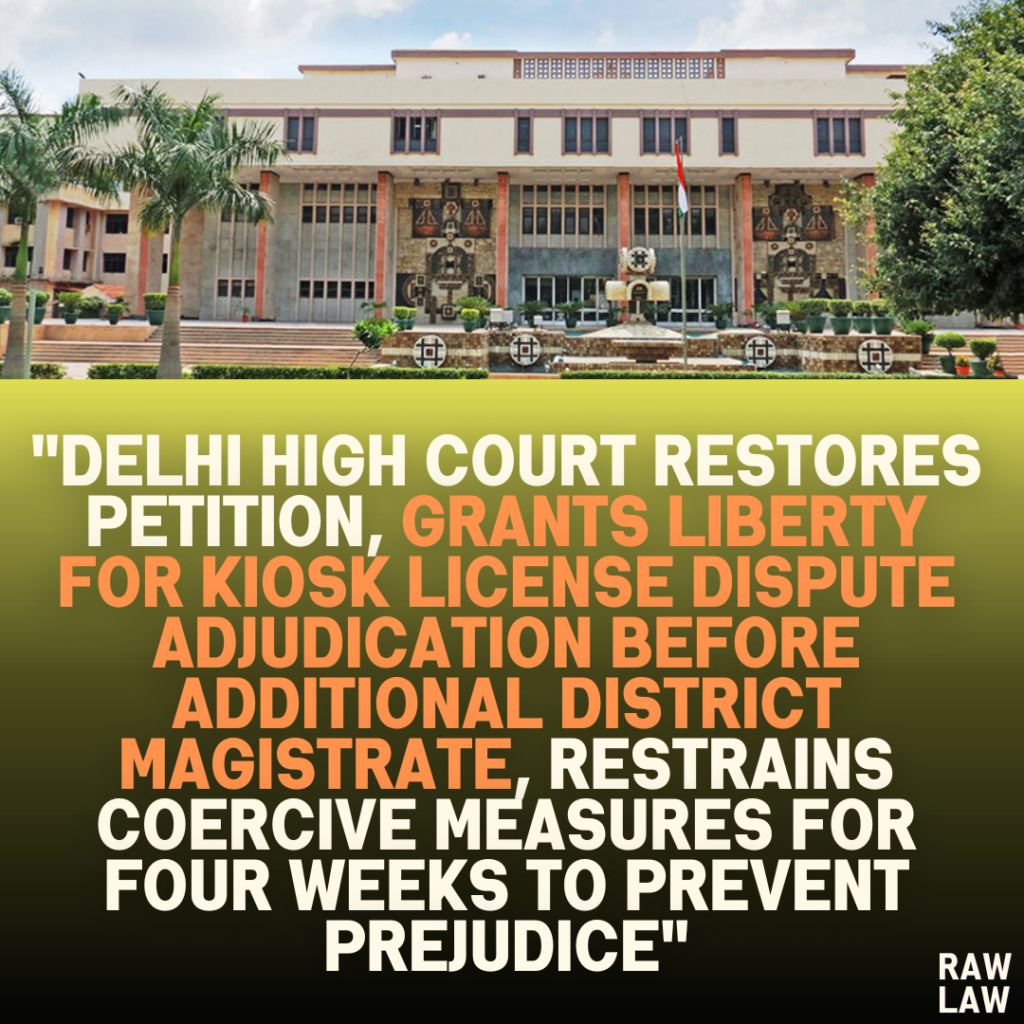Court’s Decision:
The Delhi High Court restored the petition filed by the petitioner and directed that the petitioner could approach the Office of the Additional District Magistrate (Central) for the adjudication of disputes regarding kiosk licenses. The Court ordered a temporary restraint on any coercive action against the petitioner by the respondents for the next four weeks. The decision was made without prejudice to either party’s rights and contentions.
Facts:
The petitioner filed a writ petition challenging the actions related to the licensing of kiosks in the Tis Hazari Building Complex, Delhi. The matter was previously dismissed by an order dated 05.09.2023, which the petitioner sought to recall.
Issues:
The primary issue centered on whether the petitioner was entitled to have the matter regarding kiosk licenses adjudicated by the Additional District Magistrate (Central) and if interim protection against coercive measures was warranted during this period.
Petitioner’s Arguments:
The petitioner, through counsel, requested the restoration of the writ petition and argued for the right to adjudicate their licensing dispute before the Additional District Magistrate, where similar cases were being heard for other kiosk license holders.
Respondent’s Arguments:
The respondents’ counsel did not oppose the recall of the prior order dismissing the writ petition. They confirmed that the matter regarding kiosk licenses had been referred to the Office of the Additional District Magistrate (Central) for adjudication, where similarly situated license holders were also appearing for resolution of their disputes.
Analysis of the Law:
The court analyzed the provisions governing the adjudication of licensing issues and the petitioner’s right to seek alternative remedies through the Office of the Additional District Magistrate. The legal principles of interim relief and equitable remedy were also taken into account in granting temporary protection from coercive action.
Precedent Analysis:
The court referenced established practices for resolving administrative disputes regarding licenses through designated officers. No specific judgments were cited in this case.
Court’s Reasoning:
The court reasoned that, since the respondents themselves acknowledged the referral of the dispute to the Additional District Magistrate, the petitioner should be granted the liberty to seek remedy there. The temporary restraint on coercive measures was deemed necessary to prevent prejudice to the petitioner during the pending adjudication.
Conclusion:
The writ petition was restored, and the petitioner was granted liberty to approach the Additional District Magistrate (Central) for adjudication of the kiosk license dispute. A temporary order was issued preventing coercive steps against the petitioner for four weeks, allowing both parties to act on the basis of a digitally signed copy of the order.
Implications:
This ruling affirms the court’s support for alternative dispute resolution mechanisms and provides interim relief to the petitioner, emphasizing the court’s intent to prevent undue hardship during administrative adjudications. The decision sets a precedent for similar cases where administrative disputes are referred to a specific adjudicative authority.




Pingback: Bombay High Court Criticizes Police "Lethargy" in Environmental Case; Orders SIT to Expedite Investigation into Alleged CRZ Map Forgery and Delayed Police Action, Status Report Due December 5, 2024 - Raw Law